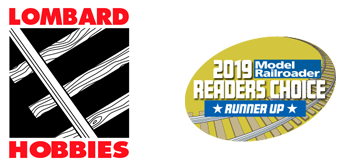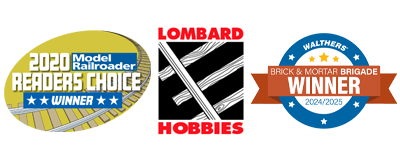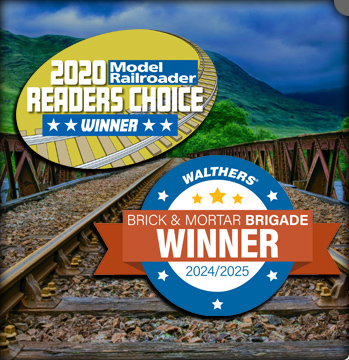Athearn HO
Athearn Genesis HO ATHG64218 DCC/Tsunami 2 Sound Equipped SDP40F Locomotive Amtrak 'Phase II' AMTK #526
- In Stock:
- 3
- Scale:
- HO
- SKU:
- ATHG64218
Description
Athearn Genesis HO ATHG64218 DCC/Tsunami 2 Sound Equipped SDP40F Locomotive Amtrak 'Phase II' AMTK #526
AMTK FEATURES:
- Oscillating headlight
- Functioning “Big Hole” Emergency light in (DCC Only)**
- Classification lights (Function in DCC only)**
- Number board lights
- Working Truck lights
- Separate see-through intake grills
- MU hoses
In the early 1970’s Amtrak needed new motive power to replace the rapidly aging locomotive fleet that they inherited. They approached EMD about creating a new locomotive to be used on most of the Amtrak routes around the country. The result was the 3,000 horsepower, steam generator equipped SDP40F. While initially a successful unit, a series of derailments soon led several of Amtrak’s host railroads to claim that these locomotives were faulty, banning them from use on their respective lines. Although this led to their early retirement, of many of the units made it into Amtrak’s Phase 2 paint scheme which we are featuring in this release.
ROAD NUMBER SPECIFIC FEATURES:
#526
- Early pointed nose body
- ATS shoe
- dual steam generators
- ACI plates
#537
- Early pointed nose body
- Icicle breakers
- dual steam generators
- ACI plates
#611
- Low profile body for East Coast service w/ low profile fans
- air filter and dual horns
SDP40F SERIES LOCOMOTIVE FEATURES:
- Illuminated ground lights
- Illuminated classification lights
- Illuminated number boards
- Front and rear trainline hoses
- Non-skid end walks
- Front and rear 3-hose M.U. hose clusters with silver ends
- Detailed and painted cab interior with control stand
- 4,500 gallon split fuel/water or rebuilt fuel only tank
- HTC sideframes with high brake cylinders and air lines
- Flush mounted portal window glass
- Minimum radius: 18” — Recommended radius: 22”
GENESIS DIESEL LOCOMOTIVE FEATURES:
- Coupler cut levers
- MU hoses
- Trainline hose
- See-through cab windows
- Full cab interior
- Walkway tread
- Windshield wipers
- Wire grab irons
- Sander lines
- Lift rings
- Fine-scale Celcon handrails for scale appearance
- Detailed fuel tank with fuel fillers, fuel gauges, breather pipes, and retention tanks
- Body-mounted McHenry operating scale knuckle couplers
- Genesis driveline with 5-pole skew wound motor, precision machined flywheels, and multi-link drivetrain for trouble free operation
- Eight-wheel drive with precision gears for smooth and quiet operation
- All-wheel electrical pickup provides reliable current flow
- Wheels with RP25 contours operate on all popular brands of track
- LED Lighting for trouble free operation
- Heavy die-cast frame for greater traction and more pulling power
- Scaled from prototype resources including drawings, field measurements, photographs, and more
- Accurately-painted and –printed paint schemes
- Fully-assembled and ready-to-run
- Packaging securely holds the model for safe storage
SOUND-EQUIPPED MODELS ALSO FEATURE
- Onboard DCC decoder with SoundTraxx Tsunami2 sound
- Dual sugar cube speakers for optimal sound quality
- Sound units operate in both DC and DCC**
- Full DCC functions available when operated in DCC mode**
- Engine, horn, and bell sounds work in DC**
- All functions NMRA compatible in DCC mode**
- Precision slow speed control
- Program a multiple unit (MU) lashup with lead unit only horn, bell, and lights
- Many functions can be altered via Configuration Value (CV) changes
- CV chart included in the box
**Lombard Hobbies Recommendation - As modelers ourselves we highly recommend ONLY running DCC on DCC systems and DC on DC systems, regardless of 'Dual-Mode' capability. This gives optimum performance and safeguards the unit from possible damage from running on a different system than originally intended and from any inexperienced operator errors.
PROTOTYPE SPECIFIC INFORMATION
Formed in 1971, Amtrak took over operation of most of America’s passenger trains with an assortment of old locomotives, primarily decades-old E-units. The carrier worked with General Motors Electro-Motive Division to design new passenger locomotives. The result was the SDP40F. Built by EMD from 1973–1974 for Amtrak and for a brief time they formed the backbone of Amtrak’s long-distance passenger fleet. With 150 built, the SDP40F became the “face” of Amtrak in the mid-1970s as they were found on the head ends of passenger trains from San Diego to Washington DC and from Seattle to Miami. Several were rebuilt and found a second life with the Atchison, Topeka and Santa Fe Railway in freight service.
The design of the SDP40F was based on the EMD FP45 passenger locomotive. Both shared the EMD 645E3 diesel engine, although the SDP40F had 16 cylinders instead of 20. The space saved from the smaller prime mover was given over to increased water capacity. The SDP40F had an underbody tank split between water and diesel fuel, carrying 2,000 gallons of water and 2,500 gallons of diesel. A second 1,500 gallon water tank sat in the carbody, forward of the steam generators which produced the steam needed for supplying heat (and sometimes cooling) and hot water for the train.
Eventually, the SDP40F was phased out as all-electric cars, such as the Amfleet, displaced the old steam heat rolling stock. While the SDP40F was designed with conversion to head-end power (HEP) in mind, the bad press they received, cost to upgrade and overhaul the units, and Amtrak’s satisfaction with the versatility of the HEP-equipped F40PH ultimately doomed the SDP40F. Amtrak was able to trade in the SDP40Fs to EMD as more F40PH units were acquired in the late 1970s. The last SDP40F was retired from Amtrak in the early 1980s.
In 1984, Santa Fe Railway traded lower-power locomotives to Amtrak for 18 SDP40Fs, horsepower-for-horsepower. The SDP40Fs were reconditioned in the railroad’s San Bernardino, California shops to the designation SDF40-2 for use as freight locomotives. Santa Fe replaced the hollow HTC bolsters with conventional HTC bolsters, converted the below-frame combination fuel/water tank to an all-fuel tank, removed the above-frame water tanks (replacing these with concrete ballast) and used the engines for nearly 15 years. They were also given front steps and platforms. Their noses were notched after a second maintenance shop visit in order to improve boarding access. In exchange, Amtrak received 43 smaller locomotives for use in switching service.
Lombard Hobbies - Big Inventory ∙ Value Pricing ∙ Fast Shipping ∙ Great Service














